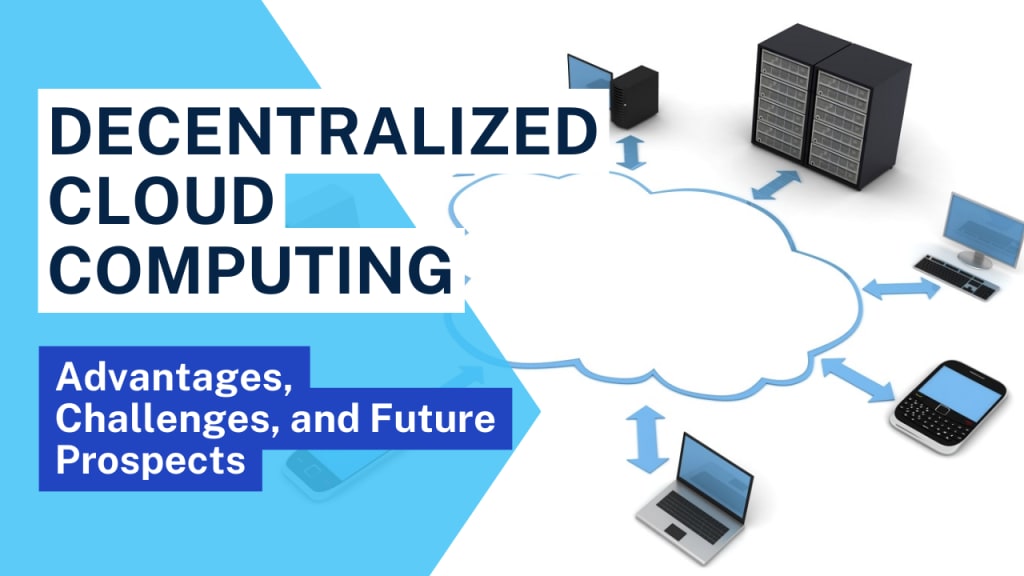Decentralized Cloud Computing: Advantages, Challenges, and Future Prospects
Decentralized cloud computing is a new paradigm that promises to address the challenges of centralized cloud computing. In this article, we will explore the advantages, challenges, and future prospects of this emerging technology.

Cloud computing has been around for over a decade, and it has revolutionized the way businesses operate. The cloud has made it possible to store and process vast amounts of data, making it easier for organizations to access and analyze information. However, centralized cloud computing has its limitations. The centralization of data storage and processing poses a significant risk to data security and privacy. Additionally, the cost of maintaining centralized cloud infrastructure is high, and it is not always reliable. Decentralized cloud computing is a new paradigm that promises to address these challenges. In this article, we will explore the advantages, challenges, and future prospects of this emerging technology.
I. Introduction
Decentralized cloud computing is a new computing paradigm that allows users to store, process, and retrieve data from a distributed network of computers. Unlike centralized cloud computing, which relies on a few large data centers to store and process data, decentralized cloud computing uses a peer-to-peer network of computers. In a decentralized cloud, users contribute their computer resources to the network, and data is stored and processed across multiple nodes. This approach provides several advantages over centralized cloud computing.
II. Advantages of Decentralized Cloud Computing
A. Improved Security and Privacy
Decentralized cloud computing offers improved security and privacy. In centralized cloud computing, all data is stored in one place, making it a prime target for hackers. In a decentralized cloud, data is stored across multiple nodes, making it difficult for hackers to access all the data at once. Additionally, decentralized cloud computing uses encryption techniques to protect data in transit and at rest, providing an extra layer of security.
B. Increased Reliability and Availability
Decentralized cloud computing is more reliable and available than centralized cloud computing. In centralized cloud computing, if the data center goes down, all the services and applications hosted on that data center will also go down. In a decentralized cloud, data is stored and processed across multiple nodes, making the network more resilient. Even if some nodes go down, the network can still function.
C. Lower Costs and Energy Consumption
Decentralized cloud computing is more cost-effective and energy-efficient than centralized cloud computing. In centralized cloud computing, maintaining large data centers is expensive and requires a significant amount of energy. In a decentralized cloud, users contribute their computer resources to the network, reducing the need for large data centers. Additionally, decentralized cloud computing can use renewable energy sources, making it more environmentally friendly.
D. More Control and Ownership for Users
Decentralized cloud computing gives users more control and ownership over their data. In centralized cloud computing, users must trust the cloud provider to protect their data. In a decentralized cloud, users own their data and can decide how and where to store it. Additionally, decentralized cloud computing uses blockchain technology to provide transparency and accountability in data storage and sharing.
III. Challenges of Decentralized Cloud Computing
While decentralized cloud computing offers many benefits, it also presents several challenges that need to be addressed. In this section, we will discuss some of the most significant challenges facing the adoption of decentralized cloud computing.
A. Scalability and performance
One of the primary challenges of decentralized cloud computing is ensuring scalability and performance. With a centralized cloud computing model, scaling up or down can be done quickly and easily by adding or removing resources. In contrast, in a decentralized model, the network must be able to scale while maintaining performance and security. The challenge is to create a system that can handle a large number of users and requests without sacrificing performance.
B. Interoperability and standardization
Another challenge is interoperability and standardization. With different providers offering different protocols and interfaces, it can be challenging to create a decentralized cloud computing system that can work seamlessly across all providers. Standardization of protocols and interfaces is necessary to ensure interoperability, but getting all providers to agree on these standards can be challenging.
C. Governance and regulation
Decentralized cloud computing can create governance and regulation challenges, as there is no central authority responsible for overseeing the network. It can be challenging to manage and regulate a decentralized system, and there is a risk of abuse and exploitation. Finding a way to govern and regulate decentralized cloud computing systems will be critical for their widespread adoption.
D. Adoption and awareness
Finally, one of the most significant challenges facing decentralized cloud computing is adoption and awareness. Many businesses and organizations are hesitant to adopt new technologies, and there is a lack of awareness and understanding of the benefits of decentralized cloud computing. Overcoming these challenges will require education, collaboration, and the development of user-friendly decentralized cloud computing solutions.
IV. Future Prospects of Decentralized Cloud Computing
Despite the challenges facing decentralized cloud computing, the future prospects for this emerging technology are promising. In this section, we will discuss some of the potential use cases, emerging technologies, and opportunities for startups and investors in decentralized cloud computing.
A. Potential use cases in various industries
Decentralized cloud computing has the potential to revolutionize many industries, from finance and healthcare to education and entertainment. For example, in the finance industry, decentralized cloud computing can enable secure and transparent transactions without the need for intermediaries. In healthcare, it can facilitate the secure sharing of patient data between healthcare providers while maintaining patient privacy.
B. Emerging technologies and innovations
Several emerging technologies, such as blockchain and edge computing, can help overcome some of the challenges facing decentralized cloud computing. Blockchain can provide a secure and transparent ledger for transactions, while edge computing can reduce latency and improve performance. Innovations in AI and machine learning can also improve the efficiency and effectiveness of decentralized cloud computing systems.
C. Opportunities for startups and investors
Decentralized cloud computing presents significant opportunities for startups and investors. With the potential to disrupt traditional cloud computing models and revolutionize various industries, there is a growing demand for decentralized cloud computing solutions. Startups that can develop user-friendly, scalable, and secure decentralized cloud computing solutions stand to benefit from this demand.
D. Impact on the cloud computing industry
Decentralized cloud computing has the potential to significantly impact the cloud computing industry. Traditional cloud computing providers will need to adapt and evolve to compete with decentralized cloud computing solutions. We may see new business models emerge, and the role of intermediaries may change.
V. Conclusion
In conclusion, decentralized cloud computing has the potential to revolutionize the way we store and process data. By distributing computing resources across a network of nodes, this emerging technology offers improved security and privacy, increased reliability and availability, lower costs and energy consumption, and more control and ownership for users.
However, there are also significant challenges to be addressed, such as scalability and performance, interoperability and standardization, governance and regulation, and adoption and awareness. It will require cooperation and innovation from developers, policymakers, and users to overcome these challenges and fully realize the potential of decentralized cloud computing.
Looking to the future, there are many exciting prospects for this technology, including potential use cases in various industries, emerging technologies and innovations, opportunities for startups and investors, and its impact on the cloud computing industry as a whole.
To fully realize the potential of decentralized cloud computing, more research and development are needed. Developers should focus on improving the scalability and performance of decentralized networks, while policymakers should work on establishing standards and regulations that encourage interoperability and governance.
Overall, decentralized cloud computing offers a promising alternative to centralized cloud computing, with the potential to provide more secure, reliable, and affordable data storage and processing. By addressing the challenges and embracing the opportunities presented by this technology, we can build a more decentralized, democratic, and equitable digital future.
About the Creator
TeckyBlock
Learn about blockchain technology, cryptocurrency, NFT and metaverse in here. please visit https://teckyblock.com for further information.






Comments (1)
Cloud computing and blockchain technology are the two on-demand technologies that are flourishing in the present industry and are used by businesses throughout the globe. One distinction is that blockchain technology’s ledger database records are immutable, while cloud storage data is not. Discover the transformative power of blockchain cloud computing: https://www.cleveroad.com/blog/blockchain-cloud-computing/